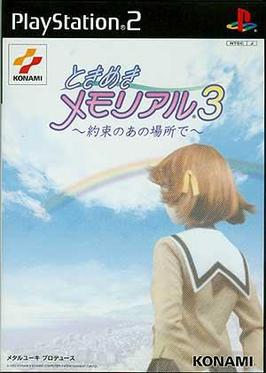
Pro Evolution Soccer 3 is a football simulation video game developed and produced by Konami as part of the Pro Evolution Soccer series. Initially released for the PlayStation 2, it is also the first in the series to be released on Microsoft Windows.

Pro Evolution Soccer 4 is the fourth installment of Konami's Pro Evolution Soccer football simulation video game series. It's the first game of the series to appear on the original Xbox, with online gameplay.

Famitsu, formerly Famicom Tsūshin, is a line of Japanese video game magazines published by Kadokawa Game Linkage, a subsidiary of Kadokawa. Famitsu is published in both weekly and monthly formats as well as in the form of special topical issues devoted to only one console, video game company, or other theme. Shūkan Famitsū, the original Famitsu publication, is considered the most widely read and respected video game news magazine in Japan. From October 28, 2011, the company began releasing the digital version of the magazine exclusively on BookWalker weekly.

International Superstar Soccer Pro is a football video game developed by Konami Computer Entertainment Tokyo. It is a slightly improved version of the Japan-exclusive J-League Jikkyō Winning Eleven 97.

ISS Pro Evolution is the third video game in the ISS Pro series, developed exclusively for the PlayStation by Konami Computer Entertainment Tokyo, a division of Konami.

Pro Evolution Soccer 5, known as World Soccer: Winning Eleven 9 in Japan and North America, is a 2005 football sports simulation video game developed and produced by Konami as part of the Pro Evolution Soccer series.
Powerful Pro Baseball, previously known as Jikkyō Powerful Pro Baseball, and eBASEBALL Powerful Pro Baseball and marketed internationally as Power Pros, is a Japanese baseball video game series created by Konami. It is known for its super deformed characters and fast-paced, yet deep, gameplay. Most games in the series are developed under license from Nippon Professional Baseball (NPB) and the Japan Professional Baseball Players Association (JPBPA), allowing the use of team names, stadiums, colors, and players' names and likenesses. Six games in the series also feature licenses from Major League Baseball (MLB) and the Major League Baseball Players Association (MLBPA), two from the Korea Baseball Organization (KBO) and Korea Professional Baseball Players Association (KPBPA), and one from the World Baseball Classic.

Pro Evolution Soccer 2, also known as World Soccer: Winning Eleven 6 outside of Europe, is the second installment of Konami's Pro Evolution Soccer football simulation video game series. The Japanese release was succeeded by an updated and improved version called World Soccer: Winning Eleven 6 Final Evolution.

Pro Evolution Soccer 6, known as Winning Eleven: Pro Evolution Soccer 2007 in the United States, is a video game developed and published by Konami. Released in 2006 for the PlayStation 2, Xbox 360, and Microsoft Windows platforms and following on the Nintendo DS and PlayStation Portable afterward, Pro Evolution Soccer 6 is the 6th edition of the Pro Evolution Soccer series for the PlayStation 2, 2nd for the PlayStation Portable and 4th for Microsoft Windows. It is the first game to debut on the Nintendo DS and the Xbox 360. The Xbox 360 version features improved graphics, but retains gameplay similar to the other console versions. The edit mode has been stripped down for the Xbox 360 release, due to time restrictions. The graphics engine on the PC does not utilise the next-gen 360 engine but is once more a direct conversion of the PlayStation 2 engine.

International Superstar Soccer, known as Jikkyō World Soccer Perfect Eleven in Japan, is a football video game developed by Konami for the Super Nintendo Entertainment System. It is the first title in the International Superstar Soccer (ISS) series of sports video games. The game sold over 500,000 copies.

Pro Evolution Soccer 2008, known as World Soccer: Winning Eleven 2008 in Asia and sometimes called World Soccer: Winning Eleven 11 (PS2) in North America, is an association football video game in the Pro Evolution Soccer series by Konami. The game was announced on 18 June 2007. Its title is different from the other Pro Evolution Soccer games in that it is of a year and not a version; this was due to EA Sports' FIFA series naming their titles with two digit numbers, which would seem that PES was a year behind FIFA. It was released for Windows, Wii, Nintendo DS, PlayStation 3, PlayStation 2, PlayStation Portable, Xbox 360 And mobile. The game sold 6.37 million units worldwide. PES 2008 was succeeded by Pro Evolution Soccer 2009. This was the first game of the series to be released for the PS3 and Wii, as well as the first game in the series to be internationally available on a Nintendo home console.

Pro Evolution Soccer 2009 is a football video game in the Pro Evolution Soccer series, which was made by Konami. It is also the exclusive licensed game of the UEFA Champions League. The Wii version is known as Winning Eleven Play Maker 2009 in Japan. PES 2009 was succeeded by Pro Evolution Soccer 2010.

Tokimeki Memorial 3: Yakusoku no Ano Basho de is a 2001 dating sim video game for the Playstation 2, developed and published by Konami.

International Superstar Soccer Pro 98 is a football video game which follows International Superstar Soccer Pro developed by Konami Computer Entertainment Tokyo. The Japanese version was re-released in late 1998 as Winning Eleven 3: Final Version with some slight improvements, such as a wider camera option. In Japan, a version of the game featuring only J-League clubs was released in December 1998 titled J-League Jikkyō Winning Eleven '98-'99.

Pro Evolution Soccer 2012 is a video game which is the eleventh edition in the Pro Evolution Soccer series developed and published by Konami. Lionel Messi, who was the cover star for the series since PES 2009, was replaced by PES 2008 cover star Cristiano Ronaldo, while Borussia Dortmund player Shinji Kagawa replaces Messi as the cover star for the Japanese release. The US and Latin American cover features Santos player Neymar and Cristiano Ronaldo.

J.League Jikkyō Winning Eleven '97, also known as World Soccer Winning Eleven 2, is a 1996 Japan-exclusive association football simulation sports video game, which was developed and published by Konami for the PlayStation. Updated international versions of the game were released as International Superstar Soccer Pro and International Superstar Soccer 64.

Pro Evolution Soccer 2013 is an association football video game, developed and published by Konami. The game was announced by Konami on April 18, 2012. For the first time of the series, all 20 teams from the Brazilian national league, Campeonato Brasileiro Serie A, are included in the game series. The UEFA Champions League and UEFA Europa League features in the game. PES 2013 was the last game in the series available on a Nintendo home console and was succeeded by Pro Evolution Soccer 2014.

eFootball Pro Evolution Soccer, known as eFootball Winning Eleven in Japan, was a series of association football simulation video games developed by Konami Digital Entertainment Co., Ltd. and published by Konami.

J-League Jikkyō Winning Eleven is a 1995 Japan-exclusive soccer simulation video game, which was developed and published by Konami for the PlayStation. It's an official J-League licensed game.

FIFA 2001 is a football simulation video game and the sequel to FIFA 2000. It was succeeded by FIFA Football 2002. It features Paul Scholes on the UK cover and Ben Olsen on the North American cover. The game's Spanish cover features Gaizka Mendieta on it. It was released on 31 October 2000 for Microsoft Windows and PlayStation, and on 24 November 2000 for PlayStation 2 as a launch title in Europe. The PlayStation 2 version was originally slated for release in the U.S. on 7 November, before it was delayed to 28 November. A Game Boy Color version was planned but cancelled.



















